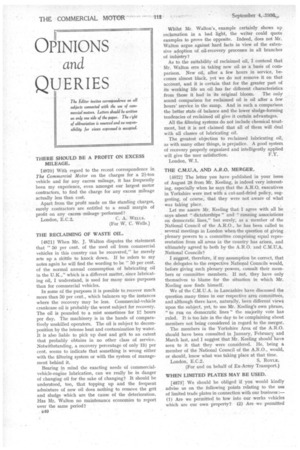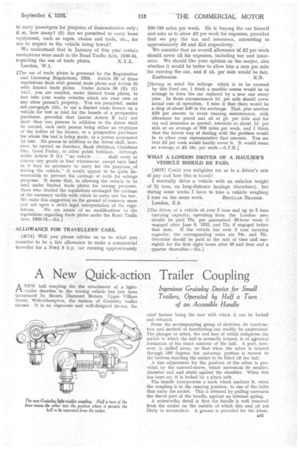OPINIONS and QUERIES
Page 54

Page 55

If you've noticed an error in this article please click here to report it so we can fix it.
THERE SHOULD BE A PROFIT ON EXCESS MILEAGE.
[4870] With regard to the recent correspondence in. The Commercial Motor on the charges for a 2i-ton vehicle and for any excess mileage, it has frequently been my experience, even amongst our largest motor contractors, to find the charge for any excess mileage actually less than cost.
Apart from the profit made on the standing charges, surely contractors are entitled to a small margin of profit on any excess mileage performed? London, E.C.2. C. A. WELLS.
(For W. C. Wells.) THE RECLAIMING OF WASTE OIL.
[48711 When Mr. J. Walton disputes the statement that "50 per cent, of the used oil from commercial vehicles in this country can be recovered," he merely sets up a skittle to knock down. If he refers to my notes again he will find the wording to be "50 per cent. of the normal annual consumption of lubricating oil in the U.K.," which is a different matter, since lubricating oil, I understand, is used for many more purposes than for commercial vehicles.
In some of the purposes it is possible to recover much more than 50 per cent., which balances up the instances where the recovery may be less. Commercial-vehicle crankcase oil is probably the worst subject for recovery. The oil is pounded to a mist sometimes for 1?.. hours per day. The machinery is in the hands of comparatively unskilled operators. The oil is subject to decomposition by the intense heat and contamination by water. It is also liable to pick up dust and grit to an extent that probably obtains in no other class of service. Notwithstanding, a recovery percentage of only 13i per cent, seems to indicate that something is wrong either with the filtering system or with the system of management behind it.
Bearing in mind the exacting needs of commercialvehicle-engine lubrication, can we really be in danger of changing oil for the sake of changing? It should be understood, too, that topping up and the frequent admixture of new oil does nothing to remove the grit and sludge which are the cause of the deterioration. Has Mr. Walton no maintenance economies to report over the same period?
. 1340 Whilst Mr. Walton's. example certainly shows up reclamation in a bad light, the writer could quote examples to prove the opposite. Indeed, does not Mr. Walton argue against hard facts in view of the extensive adoption of oil-recovery processes in all branches of industry?
As to the suitability of reclaimed oil, I contend that Mr. Walton errs in taking new oil as a basis of comparison. New oil, after a few hours in service, becomes almost black, yet we do not remove it on that account, and it is .certain that for the greater part of its working life an oil has far different characteristics from those it had in its original bloom. The only sound comparison for reclaimed oil is oil after a few hours' service in the sump. And in such a comparison the better state Of balance and the lower sludge-forming tendencies of reclaimed oil give it certain advantages.
All the filtering systems do not include chemical treatment, but it is not claimed that all of them will deal with all classes of lubricating oil.
The greatest objection to reclaimed lubricating oil, as with many other things, is prejudice. A good system of recovery properly organized and intelligently applied will give the user satisfaction. F.Y. London, W.1.
THE C.M.U.A, AND A.R.O. MERGER.
(4872] The letter you have published in your issue of August 28 from Mr. Keeling, is indeed very interesting, especially when he says that the A.R.O. executives in Yorkshire were met with a cut-and-dried policy, suggesting, of course, that they were not aware of what was taking place.
Let me assure Mr. Keeling that I agree with all he says about " dictatorships " and "running associations on democratic lines," but surely, as a member of the National Council of the A.R.O., he has been called to several meetings in London when the question of giving plenary powers to a committee comprising equal representation from all areas in the country has arisen, and ultimately agreed to both by the A.R.O. and C.M.U.A. National Councils?
I suggest, therefore, if my assumption be correct, that the delegates to the respective National Councils would, before giving such plenary powers, consult their members or committee members. If not, they have only themselves to blame for the situation in which Mr. Keeling now finds himself.
We of the C.M.U.A. in Lancashire have discussed the question many times in our respective area committees, and although there have, naturally, been different view's upon the subject, yet, to use Mr. Keeling's own phrase, "to run on democratic lines" the majority vote has ruled. It is too late in the day to be complaining about members not being considered in regard to the merger.
The members in the Yorkshire Area of the A.R.O. should have been consulted in January, February and March last, and I suggest that Mr. Keeling should have seen to it that they were considered. He, being a member of the National Council of the A.R.O., would, or should, know what was taking place at that time.
London, E.C.2. S. ROYLE. (For and on behalf of Ex-Army Transport.) WHEN LIMITED PLATES MAY BE USED.
[4873] We should be obliged if you would kindly advise us on the following points relating to the use of limited trade plates in connection with our business :— (1) Are we permitted to tow into our works vehicles which are our own property? (2) Are we permitted
to carry" passengers. for ptipOses of .denionstration oily; if so, how Many?" (3) Are we permitted to carry loose equipment, such as ropes, chains and tool's, etc., for use in respect to the vehicle being towed?
We understand that in January of this year certai;i exemptions were made in the Road Traffic Acts, 1930-34,
regarding the use of trade plates. X. Y. Z. London, W.1.
[The use of trade plates is governed by the Registration and Licensing Regulations, 1924. Article 29 of these, regulations deals with general trade plates and Article 30 with limited trade plates. Under Article 30 (B) (I) (vii), you are entitled, under limited trade plates, to tow into your works vehicles which are your own or any other person's property. You are permitted, under sub-paragraph (il), to use a limited trade licence on a vehicle for test or trial for the benefit of a prospective purchaser, provided that (under Article B (a)) not more than two persons in addition to the driver shall be carried, each such person being either an employee of the holder of the licence, or a prospective purchaser for whorn the test is being made, or a person nominated by him. No person in addition to the driver shall, however, be carried on Sundays, Bank Holidays, Christmas Day, Good Friday, or other public holidays. Although under Article B (b) "no vehicle . . • . shall carry or convey any goods or load whatsoever, except such load as it may be necessary •to carry for the purposes,. of testing the vehicle," it would appear to be quite unreasonable to prevent the carriage of tools for salvage purposes. It seems that, in allowing the vehicle to be used under limited trade plates for towing purposes, those who drafted the regulations envisaged the carriage of the necessary tackle with which to carry out the tow. We make this suggestion on the ground of common sense and not upon a strict legal interpretation of the regu
lations. We are aware of no modifications to the regulations regarding trade plates under the Road Traffic Acts, 1920-?.4.—En.]
ALLOWANCE FOR TRAVELLERS' CARS.
14874] Will you please advise us as to what you consider to be a fair allowance to make a commercial traveller for a. Ford 8 hp. car running approximately
500-700 miles per week. He is buying the car himself and asks us to allow 22 per week for expenses, provided that we pay the tax and insurance, amounting to approximately £6 and £.14 respectively.
We consider that an overall allowance of 22 per week should cover all his expenses, including tax and insurance. We should like your opinion on the matter, also whether it would be better to allow him a sum per mile for running the car, and if id. per mile would be fait.
Eastbourne. R.N.
[Having in mind the mileage which is to be covered by this Ford car, I think a sensible course would be to arrange to have the car replaced by a new one every year. In those circumstances 1d. per mile should cover actual cost of operation. I take it that there would be a drop of about £40 in the exchange. That, plus another £10 per annum to cover running maintenance, with allowance for petrol and oil at id. per mile and for tax and insurance as quoted, amounts to about id. per mile at an average of 600 miles per week, and I think that the fairest way of dealing with the problem would be to allow your representative that amount. You see that £2 per week would hardly cover it. It would mean an average of £2 10s. per week.—S.T.R.] WHAT A LONDON DRIVER OF A HAULIER'S VEHICLE SHOULD BE PAID.
[4875] Could you enlighten me as to a. driver's rate of pay and how this is based?,
I normally drive a vehicle with an unladen weight of 21 tons, on long-distance haulage (furniture), but during some weeks I have to take a vehicle weighing 5 tons on the same work. REGULAR READER. London, E.9.
[The driver of a vehicle of over 2 tons and up to 5 tons carrying capacity, operating from the London are should be paid 70s. per guaranteed 48-hour week if engaged after June 8, 1932, and 71s. if engaged before that date. If the vehicle has over 5 tons carrying capacity-, the corresponding rates are 74s. and '75s. Overtime should be paid at the Tate of time and oneeighth for the first eight hours after 48 and time and a quarter thereafter.—RI).]




























































































